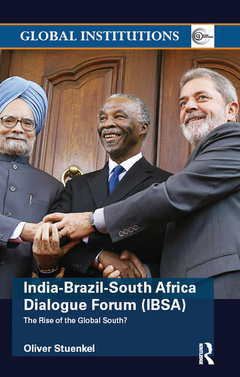Description
India-Brazil-South Africa Dialogue Forum (IBSA)
The Rise of the Global South
Global Institutions Series
Author: Stuenkel Oliver
Language: English
Subject for India-Brazil-South Africa Dialogue Forum (IBSA):
Keywords
IBSA; India-Brazil-South Africa Dialogue Forum; Global Institutions; South -South cooperation; Global South; international politics; IBSA grouping; India Brazil South Africa Forum; South-South cooperation; IBSA Forum; IBSA Dialogue; IBSA Country; India Brazil South Africa; Tamil Nadu; Military Junta; IMF Reform; India Brazil South Africa Dialogue Forum; South Africa’s Foreign Minister; Maite Nkoana Mashabane; South Africa’s Foreign; South African Foreign Policy; Brazilian Government; Democracy Promotion; SSC; South South Trade; IBSA Summit; Public Administration; Nkosazana Dlamini Zuma; World Gdp Growth; South Africa’s Foreign Policy; NAM
Publication date: 09-2014
Support: Print on demand
Publication date: 11-2016
· 13.8x21.6 cm · Paperback
Description
/li>Contents
/li>Readership
/li>Biography
/li>
The establishment of the IBSA as one of the principal platforms of South-South cooperation is one of the most notable developments in international politics during the first decade of the twenty-first century. While the concept is now frequently referred to in discussions about the Global South, there has not yet been a comprehensive and scholarly analysis of the history of the IBSA grouping and its impact on global order.
This book:
- Offers a definitive reference history of the IBSA grouping (India, Brazil and South Africa) ? a comprehensive, fact-focused narrative and analytical account from its inception as an ad hoc meeting in 2003 to the political grouping it is today.
- Situates the IBSA grouping in the wider context of South-South cooperation and the global shift of power away from the United States and Europe towards powers such as Brazil, India and South Africa.
- Provides an outlook and critically assesses what the IBSA grouping means for global order in the twenty-first century.
Offering the first full-length and detailed treatment of the IBSA, this work will be of great interest to students and scholars of International organizations, international relations and the global south.
Introduction, 1. The history of IBSA: first steps, 2. Towards institutionalization, 3. IBSA’s institutional structure, 4. Does IBSA matter?, 5. The politics of South-South cooperation: towards a new paradigm?, 6. IBSA: rising democracy promoters?, 7. Conclusion
Oliver Stuenkel is an Assistant Professor of International Relations at the Getúlio Vargas Foundation (FGV) in São Paulo, where he coordinates the São Paulo branch of the School of History and Social Science (CPDOC) and the executive MBA program in International Relations. He is also a non-resident Fellow at the Global Public Policy Institute (GPPi) in Berlin. His research focuses on rising powers; specifically on Brazil’s, India’s and China's foreign policy and on their impact on global governance.
These books may interest you

Mapping BRICS Media 160.25 €



